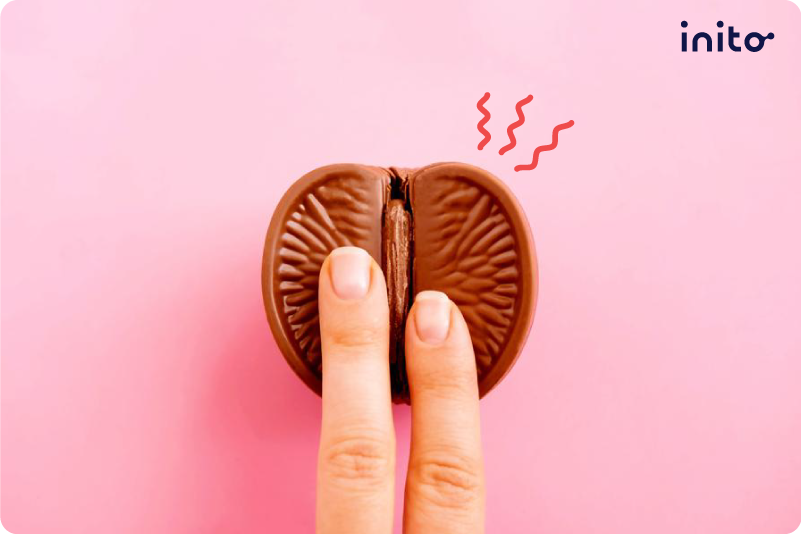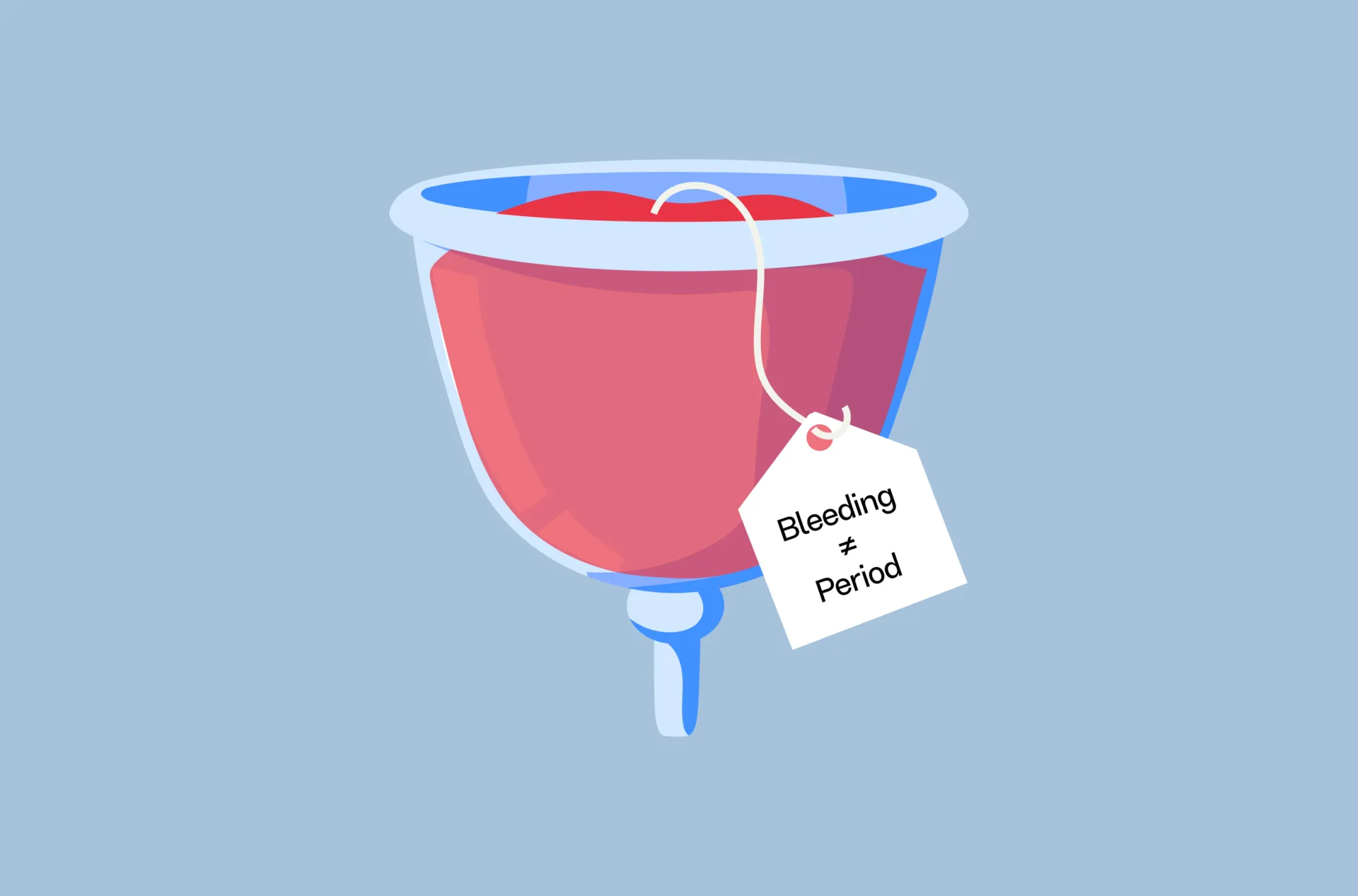Content table
First of all, what does female masturbation really mean?
Masturbation can mean different things for different people. From fantasizing, to muscle tensing, breast touching, thigh squeezing, vulva or clitoral stimulation and vaginal penetration.
Masturbation is unique to each person. It’s about exploring what feels pleasurable for you and for your body.
Key Takeaways
- Female masturbation does not directly affect fertility or cause infertility – there is no proven connection.
- Masturbation and orgasm can have a positive impact on your wellbeing. They reduce stress levels and increase your chances of healthy, regular ovulation.
- Oxytocin and prolactin are released during and after orgasm. But only temporarily and not enough to impact your hormone balance.
- Infertility in women is often due to lack of ovulation. This can be caused by stress, diet, exercise, hormone imbalance, menstrual disorders, and medicines.
- Female masturbation is an important part of wellbeing – it increases your knowledge of your own body, desires, and needs when it comes to partnered sex (or not!).
Sex educator, Emily Nagoski, reviewed 60 years of research on female masturbation.
Admittedly, this was only 4 studies. She found that rates of reported masturbation have been steadily increasing since the first study in 1953.
She also found that women masturbate in all kinds of different ways. The vast majority (around 80%) do so without penetration.
The lack of penetrative activity in these studies is not surprising, since the clitoris is the primary pleasure organ.
It is the only organ in the entire body specifically designed for pleasure, with no other proven purpose.
In fact, women have found many interesting ways to achieve pleasure and gratification through clitoral stimulation.
However, there’s very limited research into female masturbation, and the female anatomy involved in sexual pleasure – particularly the clitoris.
This could be due to the lack of necessity of female pleasure in the act of reproduction. Or part of the wider neglect by medical research to understand women’s health.
Historically, female masturbation has been stigmatized and shamed. This has led to myths and misinformation.
For example, that women don’t masturbate, or that masturbation is bad for you and that it can cause infertility.
But have we ever shamed men when they have talked openly about masturbation?
Have we questioned about male masturbation and infertility?
The answer is no. If anything, it has long been accepted that male masturbation is a normal and healthy aspect of men’s wellbeing.
Then, why isn’t it the same for women?
The story around female masturbation is changing though. Women are gradually becoming more open about it.
It is slowly being accepted by society. And as that happens, we begin to understand the physical, mental, and sexual health benefits of female masturbation.
Understanding Female Orgasm
The female orgasm is when a woman reaches a climax from sexual pleasure. However, not all female masturbation ends in an orgasm, and not all orgasms are the same.
Research suggests there are up to eleven different kinds of female orgasm, each achieved with a touch that is unique for each person.
You might be wondering what effect does female orgasm has on the body, especially for those who do reach climax?
Well, most of us are aware of the male orgasm and climax. Its importance as an essential part of human reproduction is reiterated often. But, how many of us really know about female orgasm?
To this day, the female orgasm remains mysterious and misunderstood.
Whilst male orgasms happen alongside ejaculation, female orgasms can happen any time during intercourse.
In fact, female orgasms are not dependent on the menstrual cycle. So, it is possible for you to achieve orgasm even when you are not in your fertile phase.
Having an orgasm does not cause you to ovulate – it has no impact on your fertility.
So, it is easy to see that there is hardly any connection between female masturbation, orgasm, and fertility.
And female orgasm is not strictly ‘necessary’ to conceive. But does it necessarily mean not relevant?
Does Female Masturbation Cause Hormonal Imbalance?
When a female orgasms, she releases two hormones called oxytocin and prolactin.
Oxytocin is known as a ‘happy hormone’ or ‘love hormone’. It’s a chemical that causes increased feelings of happiness, relaxation, and trust.
Oxytocin reduces stress levels and helps create a bond between the partners. It is released during sexual activity, childbirth, and breastfeeding to support reproductive functions.
Oxytocin encourages the uterus and fallopian tubes to contract and release during birth.
While oxytocin levels rise during sexual activity, prolactin levels rise after the orgasm. It is thought that the amount of prolactin released shows the strength of the orgasm and the level of satisfaction.
Prolactin may temporarily reduce your libido as your body soaks in the sexual satisfaction.
There is some evidence to suggest that abnormally high levels of prolactin can disrupt your menstrual cycle.
However, the usual spike after orgasm is temporary. It doesn’t have any effect on your cycle.
Even though both oxytocin and prolactin levels rise during sexual intercourse, female masturbation and orgasm, they do not have a direct imapct on your fertility or your menstrual cycle.
Does Female Masturbation Affect Ovulation?
There is no direct link between female masturbation and ovulation. The release of oxytocin does have a positive impact on the body.
It reduces stress levels, boosts your sense of happiness, and deepens connections with others. This, in turn, can profoundly improve your physical and mental wellbeing.
But does it mean female masturbation increases fertility?
No, not directly. It’s important to remember that masturbation does not induce ovulation.
But regular masturbation can positively affect ovulation and its regularity. By limiting stress levels and increasing feelings of relaxation, masturbation can help ensure a regular menstrual cycle.
Stress is one of the key factors that prevent or disrupts ovulation in females. It can confuse or mute the connection between your brain and your ovaries, preventing the body from being fertile.
This is a kind of crisis response by your body. When the brain senses excessive stress, it signals the ovaries that the body is not in a safe state for reproduction. As a result, the ovaries delay ovulation.
But, we have seen that masturbation reduces stress, relaxes the body, and boosts a sense of wellbeing.
So, it is safe to say that female masturbation has an indirect but positive impact on ovulation.
But what really causes infertility in women?
Infertility is most commonly caused by problems with regular ovulation, making it difficult or impossible to conceive.
- Environmental factors which impact ovulation include stress, diet, exercise, and smoking.
- Other ovulation problems can be caused by hormonal imbalances, such as Polycystic Ovary Syndrome (PCOS), an over or under active thyroid gland, or premature ovarian failure.
Scarring from surgeries around the pelvic area can also damage the ovaries or fallopian tubes, preventing an egg from entering the uterus. - Cervical mucus allows the sperm to swim through the female reproductive system. So, problems with mucus production or consistency can also affect fertility.
- Growths around the ovaries, in the fallopian tubes or uterus can also disrupt ovulation. They can block the egg’s path to the uterus.
- These growths may be non-cancerous fibroids or endometrial growths composed of the womb lining. This is a condition known as endometriosis. It can damage the reproductive tract and cause infertility.
- Sometimes, women who have undergone surgery for endometriosis experience scar tissue. Scar tissue can also prevent ovulation by blocking the reproductive tract.
- Medicines and drugs, such as nonsteroidal anti-inflammatory drugs (NSAIDs), chemotherapy, and neuroleptics, can sometimes cause irregular cycles and infertility.
Can Female Masturbation Cause PCOS?
As we discussed, female masturbation can cause slight changes in hormones. So, you may be wondering – can female masturbation cause PCOS?
The answer is, no. Polycystic ovary syndrome is caused by excess androgen in the body. This enlarges the ovaries and causes them to develop an abnormal number of cysts.
Although occasional ovarian cysts are normal, too many can prevent ovulation. This is because the follicles are unable to mature and release.
PCOS can lead to weight gain, loss of libido, and mental health problems. These, in turn, may impact sexual ability.
Irregularities with the menstrual cycle, particularly lack of ovulation, can have a big impact on sexual desire.
Masturbation can provide a way for women with PCOS to reconnect with their bodies and increase their libido.
Read More : Get Pregnant with PCOS: Your Complete Guide
Does Female Masturbation Affect Fertilization and Implantation?
There’s no evidence to suggest that female masturbation has any impact on the fertilization and implantation of embryos.
Some scientists have theorized that increased levels of oxytocin caused by orgasm could help retain sperm.
However, this study worked with synthetic oxytocin 60 times stronger than the spike caused by masturbation.
This means we still don’t fully understand the genuine chemical effects of masturbation and orgasm in females.
The stigma around female masturbation is slowly going away. We are seeing a shift in the acceptance of female masturbation and female orgasm.
It is gaining a normalcy among many women and even men. However, there’s still quite a way to go.
Hopefully, we will see more research and deeper insights in this area. Something that will help women understand their bodies and their sexual needs.
Was this article helpful?
-
- Sperm transport in the human female genital tract and its modulation by oxytocin as assessed by hysterosalpingoscintigraphy, hysterotonography, electrohysterography and Doppler sonography
- Sexuality in women with polycystic ovary syndrome: a pilot study
- Polycystic ovary syndrome – NHS
- The Benefits of a Healthy Sex Life | Center for Women’s Health | OHSU
- Could intranasal oxytocin be used to enhance relationships? Research imperatives, clinical policy, and ethical considerations
- These Are the Moves That Really Make Women Orgasm, According to Science
- https://enagoski.medium.com/what-60-years-of-research-says-about-womens-masturbation-f3b842343454
- https://books.google.co.uk/books/about/Sexual_Behavior_in_the_Human_Female.html?id=9GpBB61LV14C&redir_esc=y&hl=en
- The Clitoris, Uncovered: An Intimate History – Scientific American












